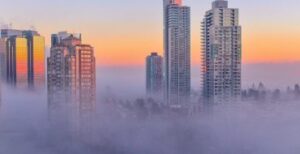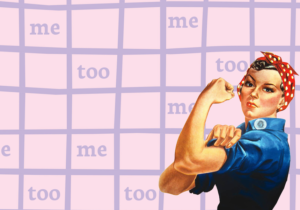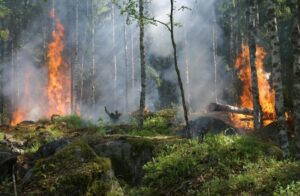
When Vancouver hosted the Winter Olympics, there seemed to be little opposition to the international event, but during the winter of 2010, I ran into a group of black-clad militants in balaclavas marching in unison down Pender Street. My meeting with the anarchists happened a few minutes before they threw some rubbish bins at the Hudson’s Bay department store display window on Seymour. The window in question displayed Olympic-themed toys and winter wear – products, which the anarchists found offensive. On the way to the Hudson’s Bay, the uniformed anarchists passed some pamphlets to me and other inquisitive onlookers along West Pender. A pale ginger-haired girl gave me a sheet of radical propaganda.
An orgy of moneymaking and reactionary nationalism.
I took the elevator up to my room on the fourth floor of my downtown residence and reread this crude, punk rock pamphlet over and over again. I loved the rough graphics and shared their reservations about the Olympics. However, the pamphlet represented a piece of unsophisticated radicalism – a kind of fanatical posturing which no longer aroused much interest. The uniforms of the anarchists were also ridiculous, and the Black Bloc’s destructive methods were nonsensical and distancing.
Of course the hockey-loving lout riot of 2011 had been much worse. Ironically, the famous hockey commentator Don Cherry though some anarchists were responsible. But these jersey wearing thugs weren’t passing out pamphlets, giving speeches, or conducting absurd street theatrics. The rioting hockey fans of last spring were merely vicious jocks with no ideological motives, and they were surely much worse than the students in Quebec this spring. Having witnessed the Canucks riot from a window on my building overlooking Dunsmuir Street, I’ll never forget the burning cars, smashed windows, uncontrolled violence, and the marching riot police – all for a lost hockey game.
Anarchism is a confusing term, simply because this vague ideology has taken on many forms. The socialist Black Bloc protesters seem to yearn for the Barcelona revolution of the 1930s, and libertarians such as Ron Paul hope to abolish all forms of government. The most genial branch of anarchism represents a nonviolent, pacifist ideal and doesn’t reject activism or equalitarian ideals, which was Tolstoy’s anarchism. This style of anarchism abstains from forceful violent activity, inclusive with the Kantian dismissal of instrumentalism, or the denunciation of nationalistic battlefield heroics.
In Benjamin Frank’s study of British anarchists, he quoted the liberal humanist anarchist Giovanni Baldelli:
The renunciation of violence and deception, however motivated, is the first and fundamental condition to the achievement of freedom and peaceful existence… Pg. 140, Rebel Alliances, Benjamin Franks.
Although insignificant, the Olympic anarchist protest made me question the new left’s role in the 21
st century. Are street protests still valid? Have revolutionary politics become an overdone cliché with kids in black tuques dishing juvenile, photocopied pamphlets? In the end, what kind of society are progressives like me hoping to create?
I asked myself these questions while attending the Occupy Vancouver protest on a blustery cold November evening at the art gallery last year. I didn’t receive any genuine answers at the art gallery, but the Occupy folks wrote better pamphlets with footnotes.
Two girls at the protest believed I was a police infiltrator, so I left the art gallery 20 minutes into reading an intense academic leaflet on neo liberalism, but I didn’t fit into their scene anyhow.
Although I still applaud the Occupy Movement in general, this western-hemisphere-based protest appears to focus on middle class student whingeing. There are many people who are barely surviving in the East Vancouver downtown hotel scene, who’ve endured greater hardships in life than high tuition fees and low-paying jobs.
However, I understand the frustrations of the Occupy Movement. Although I’m happy for my university schooling, my student debt load has been astronomical, so it’s good the students in Quebec and elsewhere are taking the streets over tuition increases and related issues. However, everyone’s ultimately responsible to create opportunities for themselves. Hard work, a positive attitude, and great determination will accomplish much in life, regardless of anyone’s political colour. Bah, I know I’m sounding like your father, but this really is true.
There are still collective efforts which society must resolve, including gender, and economic equality, the protection of our environment. I also support policies which ensure universal accessibility to education, housing, and better wages. Finally, it’s time to see an end to the war on terror, and conclude the failed war on drugs – both of these losing battles have been ineffective and costly.
I’m sure most progressives would agree with me on all of these points, but there are traditional socialist authorities who support the war on drugs with a greater vengeance than their Canadian, British, or American governmental counterparts. On this last point, the left and the right fail to be consistent.
In the world’s reddest, socialist countries, smoking weed is often an extreme, unlawful offence. If you use pot in Vietnam, you risk the possibility of being executed. If one possesses more than 20 grams of reefer in Chavez’s Venezuela, a 20-year prison sentence is a possibility. Skunk in Cuba? Not a chance – even though the island’s within spitting distance of ganja-heaven Jamaica.
On the right side of the spectrum, some Fraser Institute academics hope to keep marijuana illegal in Canada, because the United States might object if we don’t. Yet the Fraser Institute sponsored a paper in 2001 advocating a policy leaning towards harm reduction, because other members realized the lavish war on drugs has malfunctioned. (See
Sensible Solutions to the Urban Drug Problem, August 22, 2001).
My column
Rethink will examine politics from an anti-label, new left perspective. Clunky and violent Soviet revolutions, and bearded, bomb throwing anarchists are out. Pacifism, environmentalism, peaceful demonstrations, equality, and the struggle for personal freedoms are in.
 When Vancouver hosted the Winter Olympics, there seemed to be little opposition to the international event, but during the winter of 2010, I ran into a group of black-clad militants in balaclavas marching in unison down Pender Street. My meeting with the anarchists happened a few minutes before they threw some rubbish bins at the Hudson’s Bay department store display window on Seymour. The window in question displayed Olympic-themed toys and winter wear – products, which the anarchists found offensive. On the way to the Hudson’s Bay, the uniformed anarchists passed some pamphlets to me and other inquisitive onlookers along West Pender. A pale ginger-haired girl gave me a sheet of radical propaganda.
When Vancouver hosted the Winter Olympics, there seemed to be little opposition to the international event, but during the winter of 2010, I ran into a group of black-clad militants in balaclavas marching in unison down Pender Street. My meeting with the anarchists happened a few minutes before they threw some rubbish bins at the Hudson’s Bay department store display window on Seymour. The window in question displayed Olympic-themed toys and winter wear – products, which the anarchists found offensive. On the way to the Hudson’s Bay, the uniformed anarchists passed some pamphlets to me and other inquisitive onlookers along West Pender. A pale ginger-haired girl gave me a sheet of radical propaganda.









